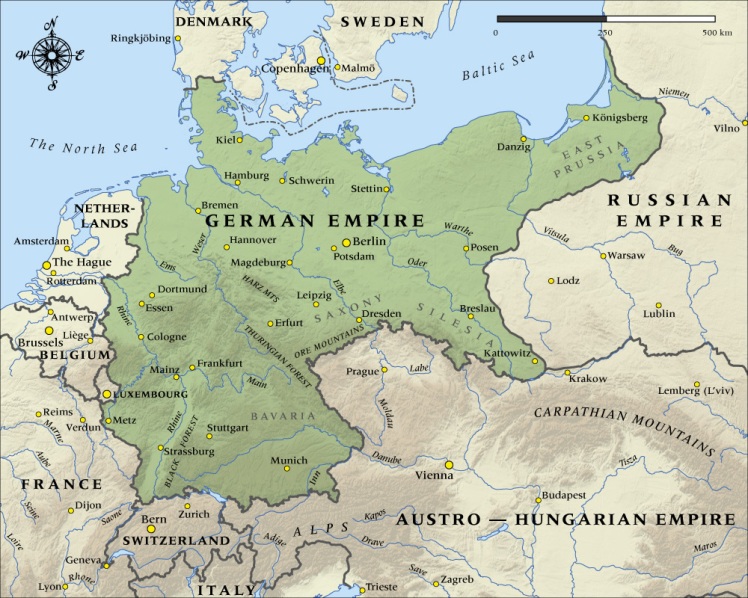
A map of the German Empire after 1871.
The powerful German Empire was not always so. In the early 1800’s, a mere 100 years before WW1, German lands were split among many small feuding states. The Kingdom of Prussia, which in 1816 annexed the Kingdom of Brandenburg, was the foremost German power alongside Austria. Alongside this, Prussia had a long history of militarism and a highly-trained army, with strict military advisers. In 1849, Otto von Bismarck was elected to the Landtag, or Prussian parliament. After some time earning the respect of his peers and the people, in 1862, König Wilhelm of Prussia appointed Bismarck as Minister President of Prussia and Foreign Minister. This gave him almost absolute power. Bismarck, being very smart and manipulative, easily controlled König Wilhelm. In 1866, Bismarck started a short, decisive war with Austria, proving Prussia as the dominant force in German territory. This war caused the Prussians and their allies to decide to form the North German Confederation, which was comprised of 22 German states. Nationalism throughout German-speaking Europe rose significantly as the people saw the easy victory over the Austrians, who had previously for many years been a dominant power in Europe.
Then, in 1870, Bismarck manipulated a letter from König Wilhelm to the French. The manipulation of the letter caused the French to become enraged. This caused them to declare war on the North German Confederation, just as Bismarck had hoped. After a year of fighting, the Prussians came out victorious. They annexed the territories of Elsass and Lothringen, or Alsace-Lorraine, from the French. This victory over the previously most powerful country caused the rest of the German states to see the incredible power that a united Germany could have. After a few months, the rest of the smaller states confederated to form the German empire, with exception to the Principality of Liechtenstein, which still exists to this day. Bismarck crowned Wilhelm as Kaiser Wilhelm I of the German Empire, and Bismarck became the Grand Chancellor.
After Kaiser Wilhelm I died on March 9, 1888, his son Kaiser Frederick III came to power. he died after only 3 months on June 15, 1888. His son, Kaiser Wilhelm II then rose to the German throne. He would become the last German Kaiser due to his major role in the first world war. The German Empire lasted from 1871 to 1918, with the end of World War 1 bringing an end to the once great empire. The fall of this empire set the stage for the rise of Nazism and set the backdrop for the second world war.